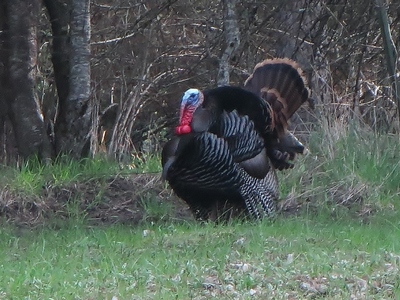Oh, sing to the LORD a new song! Sing to the LORD, all the earth. Ps 96:1
When we first moved here several years ago, I rarely saw or heard a wild turkey while hiking. As the years went by, the turkeys have done very well for themselves. They are not native to where we live; they were introduced over 50 years ago. I don’t know what data was gathered before turkeys were brought to my home state those many years ago. The idea of introducing a new species to an area – be it bird, fish, or wildlife – without some extensive research and scrutiny, is no longer thought to be a good practice by most managers.
I recently took the above photo from inside our house. There were a few hens clucking and yelping about the yard as this male strutted and gobbled every once in a while. They stayed around for the better part of an hour before disappearing back into the timber. Turkeys make a multitude of different sounds as they seem to be almost singing back and forth to each other while they forage for food.
Turkeys roost in large, open trees at night. Once there, the big birds are off the ground and out of reach of some major predators. Their perch allows them to use their keen eyesight to watch for approaching danger. Similarly, a turkey’s hearing is also reported to be much better than that of humans.
By springtime, the large turkey flocks of winter are reduced to much smaller groups. Most of these birds will be females, with usually one dominant male over his harem. Wild turkeys breed in April and May in our part of the world.
Turkeys can weigh over 20 pounds and stand 45 inches high. For being such a large bird, they can still glide for nearly a mile on their short, heavy wings.
I’ve been hiking and heard an almost surreal whistling sound from above. I’ve looked up in time to see a couple of turkeys streaking across the sky as they glided down the mountain. They’ve been clocked at close to 60 mph during their glides. That’s cooking. Imagine being in the wilderness and seeing a couple of 20 lb. rockets whistling over your head at about 60 mph. That will get your attention. Usually, however, turkeys prefer to walk or run to get to where they’re going.
Wild turkeys eat a large variety of food: seeds, nuts, plant buds, worms, insects, and even small snakes and frogs. I’ve been told that, although not their main staple, turkeys will eat ticks if given the chance. That being the case, I won’t be complaining about seeing a few turkeys on any of my future hikes.
Have a great day.

Great turkey photo Thomas.
Thank you very much.